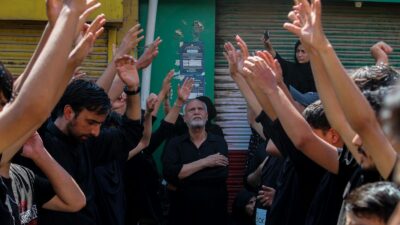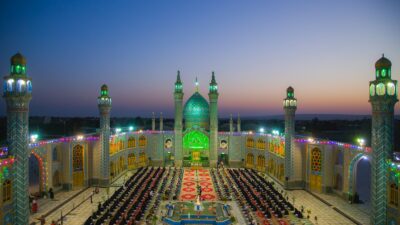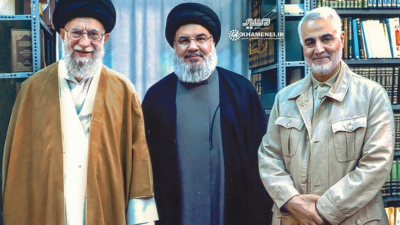Introduction
This article describes the events that led to the martyrdom of Hussain (may Allah be pleased with him).
Soon after being chosen as the Caliph, Ali b. Abi Talib (ra) shifted the Caliphate from Medinah to Kufa in Iraq. The Kuffans were staunch followers of Ali. In 40 AH, Ali was martyred at the hands of a fanatical group called the Khawaarij.
After the death of Ali, many of the Kuffan Shia joined the forces of Hasan ibn Ali (ra) and pledged allegiance to him. However, Hasan did not trust these Shia. The prominent Shia author Abu Mansur at-Tabarsi has preserved the following remark of Hasan: “By Allah, I think Muawiyyah would be better for me than these people who claim that they are my Shia.”1
Hasan b. Ali makes peace with Muawiyyah
In 40 AH, Hasan made peace with Mu’awiyyah (ra) ceding the Caliphate to him. This event which became known as the year of unity was foretold by the Prophet salalahu alaihi wa sallam: Al-Hasan (Al-Basri) said,
“I heard Abu Bakr saying, “I saw Allah’s Messenger (ﷺ) on the pulpit and Al-Hasan bin `Ali was by his side. The Prophet (ﷺ) was looking once at the people and once at Al-Hasan bin `Ali saying, ‘This son of mine is a Saiyid (i.e. a noble man) and may Allah make peace between two big groups of Muslims through him.”2
The Shia protested at this peace treaty, and Hasan’s reply is preserved in one of their most significant texts:
“By Allah, I handed over power to him for no reason other than the fact that I could not find any supporters. Had I found supporters I would have fought him day and night until Allah decides between us. But I know the people of Kufa. I have experience of them. The bad ones of them are no good to me. They have no loyalty, nor any integrity in word or deed. They are in disagreement. They claim that their hearts are with us, but their swords are drawn against us.” [Al-Kafi, vol. 8 p. 288]
Following this reconciliation between Hasan and Mu’awiyyah, the Shia’t Ali remained in Kufa. After the death of Hasan, his brother Hussain b. Ali remained loyal to Mu’awiyyah and rejected the request of the Kufans to revolt against Mu’awiyyah.
The Shias invite Hussain to Kufa
Upon Mu’awiyyah’s death in 60 AH, the Caliphate passed to his son Yazid. While many prominent figures, including sixty Companions (Sahaabah), gave their pledge of allegiance (bay’a) to Yazid, Hussain ibn Ali withheld his and remained in Makkah.
In Ramadan of 60 AH, Hussain began receiving numerous letters from the people of Kufa, where he was residing in Mecca. These letters consistently assured him of their unwavering loyalty and allegiance, explicitly stating their rejection of Yazid as their leader. Consequently, Hussain decided to send his cousin, Muslim Ibn Aqil, to Kufa to assess the situation.
Muslim Ibn Aqil arrived in the month of Dhul Qada. There, he was met by the Kufans, and 12,000 of the Shia’t Ali of Kufa pledged their support. They promised to fight with and to protect Hussain with their lives and their wealth. When the number of those who pledged support reached 18,000 Kufans, Ibn Aqil felt sufficiently confident to send a messenger to Hussain, informing him of the Kufans’ oath of allegiance and urging him to proceed from Mecca to Kufa.
Hussain proceeds to Kufa
Despite the earnest pleas of many Companions who warned him against the treachery of the Kufans, Hussain ibn Ali and his relatives began their fateful journey to Iraq. Among those who advised Hussain was Abdullah ibn Abbas, who offered the following words:
“to whom are you heading out to? To those who killed your father and stabbed your brother?!” Musanaf Ibn Abi Shayba (7:477)Rumors of the unfolding events in Kufa quickly reached Caliph Yazid in Damascus. In response, he dispatched Ubaydullah ibn Ziyad with orders to find and capture Muslim Ibn Aqil.
Upon Ubaydullah’s arrival in Kufa, Muslim Ibn Aqil called upon the Kufans to defend him. Initially, 40,000 men rallied to his side. However, hearing Ubaydullah’s threats, they began to desert Muslim Ibn Aqil, leaving him with only 500 men. This number dwindled further to a mere thirty men, and eventually, even these thirty abandoned him.
Completely alone, Muslim Ibn Aqil sought refuge in the house of an old woman. Tragically, the old woman’s son informed Ubaydullah of Ibn Aqil’s hiding place. A detachment was immediately sent to arrest Muslim Ibn Aqil, but before his capture, he managed to send a final, urgent message to Hussain, instructing him to turn back.
The Execution of Muslim Ibn Aqil
Later that very day—the Day of Arafah—Muslim ibn Aqil was led to the highest ramparts of the fort. His final words before his execution were a poignant plea:
“O Allah, You be the Judge between us and our people; they deceived us and deserted us.”
The people of Kufa bore witness to his execution, yet not a single individual came to his aid.
The Execution of Qais ibn Mushir
Meanwhile, Hussain had dispatched a messenger, Qais ibn Mushir, to inform the Kufans of his impending arrival. Qais was captured by Ubaydullah, who ordered him to ascend the walls of the fort and publicly curse Hussain and his father. Defiantly, Qais ibn Mushir instead praised Ali and Hussain, informing the Shia of Kufa that Hussain was on his way and exhorting them to defend him. Immediately after this courageous act, Qais ibn Mushir was executed.
Treachery in Iraq
On reaching Iraq, Hussain was met with the shocking reality that the Shia of Kufa, who had so fervently invited him, had instead joined the army dispatched to intercept him. Consequently, he altered his route, heading not directly to Kufa but aiming towards Syria. Hussain’s company at this point consisted of only about eighty individuals.
The Kufan army, under the command of Umar ibn Sa’d, intercepted him at Karbala. As explicitly stated in multiple Shia sources, the very Kufan Shias who had pledged their allegiance to him were now preparing to fight him. Hussain then addressed the Kufan army, saying:
“I did not come to Kufa without being asked to come. I received numerous letters from you stating you had no Imaam and you asked me to come. So it was obligatory upon you to stick to your promise and to obey me, but you broke your promise and your pledge of allegiance to me. This is not something strange or new to us, as you people proved disloyal and treacherous to my father, my brother (Hasan) and my cousin Muslim bin Aqil. If you did not wish for me to come, then I will return back to where I came from.”3
When the Kufans heard Hussain’s words, they denied ever having written to him. In response, Hussain called out some of their names, retrieved their letters, and read them aloud. “now when I have arrived here, you are adamant on killing me.”4
Hussein addressed a number of prominent Shia who were now preparing to fight him:
“didn’t you write to me telling me that the fruits have ripened, and the fields have turned green, and that I would be arriving to an army set [to be under my command?”
The Standoff at Karbala and Hussain’s Martyrdom
At Karbala, Hussain met with Umar ibn Sa’d, the representative of Ibn Ziyad. Hussain proposed three options to him:
“Give me the right to three things, either let me go to the borders (of the Islamic lands), or let me return back to Madeenah or let me go directly to Yazeed ibn Mu’awiyyah so that I can give him my pledge of allegiance! So Umar (ibn Sa’ad) accepted this from him.”5
However, Ibn Ziyad refused all three options, demanding that Hussain surrender to him unconditionally. Hussain rightfully refused this demand. Consequently, Ibn Ziyad ordered a 4,000-strong army to attack Hussain and his family.
Forced to defend himself against overwhelming odds, Hussain was tragically martyred along with many members of his family. Among those killed at Karbala were Abu Bakr bin Ali, Umar bin Ali, Uthman bin Ali, Abu Bakr bin al-Hasan bin Ali, and Umar bin al-Hasan bin Ali. (It is notable to observe the names the Ahl al-Bayt chose for their sons.) Hussain ibn Ali was 58 years old at the time of his martyrdom. This tragic calamity occurred on Friday, 10th Muharram, in the year 61 AH. Allah honored him with martyrdom and brought disgrace and dishonor upon his killers.
Who were the killers of Hussain?
Hussain was killed at the hands of two evil men: Sinaan b. Anas and Shimr bin Dhil-Jawshan.6 Shimr had previously participated alongside Ali (ra) during his conflict with Muawiyah (ra) and was a prominent figure among the Shia.7 He was the one who decapitated the noble head of Hussain.
Prominent Shia scholars have also reflected on the events surrounding Hussain’s martyrdom. Mullah Baaqir Majlasee, in Jalaa al-A’ayoon (p. 468), narrates a powerful statement attributed to Hussain:
May Allaah’s curse be upon you and your intentions, you tyrannical, disloyal and treacherous Shia, you have carved my chest with a dagger.” (Jalaa al-A’ayoon, p. 468).
Majlasee further states in Jalaa al-A’ayoon (p. 68):
“In the end it was these disloyal Shia who martyred Hussain”
As-Sayyid Muhsin Al-Amîn in A`yân As-Shî`ah, 1:34, wrote,
“Twenty thousand people in Iraq swore the oath to al-Husayn, but (they) betrayed him and rose against him. They turned their backs on their pledge and murdered him.”
Shia sources that blame the Kufan Shia for the martyrdom of Hussain
A’yaan Al-Shi’ah Volume I, p. 26 by Muhsin al-Amin
Al-Malhama Al-Husseiniya Volume I, p. 129 by Murtada Al-Mutahari
Nafs Al-Mahmoum p. 263 by Abbas Al-Qumi
‘Ashura p. 89 by Kazem Al-Ihsaei Al-Najafi
Al-Ihtijaj Volume II, p. 92 by Abu Mansur at-Tabarsi
Having explained the events that led to the martyrdom of Hussain, in the next article we examine the religious and political consequences of Hussain’s martyrdom.
For further information, read this excellent book.
- al-Ihtijâj vol. 2 p. 290-291 ↩︎
- (Bukhari ↩︎
- Taareekh al-Umam Wal-Malook (2/228-229) ↩︎
- Najeebabadi: The History of Islam, volume two, p. 77) ↩︎
- al-Asaabah Fee Tamayyiz as-Sahaabah 2/71 ↩︎
- He was from the tribe of Bani Kilab, and from the chiefs of Hawazin. ↩︎
- Mustadrakat Ilm Rijal al-Hadith – Sheikh Ali al-Namazi al-Shahroudi – Vol. 4 – Page 620; Al-Qummi, “Safinatun-Najaat”, vol.4, p. 492 ↩︎





